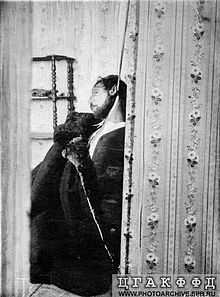Georgy Gapon
| Georgy Gapon | |
|---|---|
 | |
| Born |
Georgiy Apollonovich Gapon February 17, 1870 Poltava, Russian Empire |
| Died |
April 10, 1906 (aged 36) Saint Petersburg, Russian Empire |
| Other names | Father Gapon |
| Occupation | Priest, political activist |
Georgiy Apollonovich Gapon (Russian: Гео́ргий Аполло́нович Гапо́н; 17 February [O.S. 5 February] 1870 — 10 April [O.S. 28 March] 1906) was a Russian Orthodox priest and a popular working class leader before the Russian Revolution of 1905.
Biography
Early life
Father Gapon was born in what is now Ukraine to a family of peasants.[1] He was educated in a theological seminary and married in 1896, but was widowed in 1898. Graduating from the Saint Petersburg Theological Academy in 1902, Gapon became a religious teacher at the St. Olga children's orphanage in 1900 and became involved in working with factory workers and families impoverished by unemployment.[1]
Bloody Sunday incident

Father Gapon, under the financial support of Colonel Motojiro Akashi of the Imperial Japanese Army[2] organized the Assembly of Russian Factory and Mill Workers of St. Petersburg, which was also patronized by the Department of the Police and the St. Petersburg Okhrana (secret police). The Assembly's objectives were to defend workers' rights and to elevate their moral and religious status. He was the person to lead the industrial workers to the city of Russia during the year 1905 before bloody Sunday with courage. Only persons of Russian Orthodox denomination were eligible to join its ranks. Soon the organization had twelve branches and 8,000 members, and Gapon tried to expand activities to Kiev and Moscow. Gapon was not simply an obedient instrument of the police; cooperating with them, he tried to realize his own plans.
From the end of 1904, Gapon started to cooperate with radicals who championed the abolition of the Tsar's autocracy.
On January 22 [O.S. January 9] 1905, the day after a general strike burst out in St. Petersburg, Gapon organized a workers' procession to present a petition to the Tsar, which ended tragically (Bloody Sunday 1905).[3] Gapon's life was saved by Pinchas Rutenberg, who took him away from the gunfire. He then became the guest of Maxim Gorky.[4]
Following Bloody Sunday, Gapon anathematized the Tsar and called upon the workers to take action against the regime, but soon after escaped abroad, where he had close ties with the Socialist-Revolutionary Party. Gapon and Rutenberg were welcomed in Europe by both prominent Russian emigrants Georgy Plekhanov, Vladimir Lenin, Peter Kropotkin, and French socialist leaders Jean Jaurès and Georges Clemenceau. He found sanctuary in Geneva[5] and in London at 33 Dunstan House, Stepney, with anarchists Peter Kropotkin and Rudolf Rocker. After the October Manifesto, before the end of 1905, Gapon returned to Russia and resumed contact with the Okhrana.
Suspected as an agent provocateur

Gapon soon revealed to Rutenberg his contacts with the police and tried to recruit him, too, reasoning that double loyalty is helpful to the workers' cause. However, Rutenberg reported this provocation to his party leaders, Yevno Azef[6] (who was himself a secret police spy) and Boris Savinkov. On March 26, 1906 Gapon arrived to meet Rutenberg in a rented cottage outside St. Petersburg, and after a month he was found there hanged. Rutenberg asserted later that Gapon was condemned by the comrades' court. In reality, three S.R. party combatants overheard their conversation from the next room. After Gapon had repeated his collaboration proposal, Rutenberg called the comrades into the room and left. When he returned, Gapon was dead.
In popular culture
He was portrayed by Julian Glover in the 1971 film Nicholas and Alexandra and by Kenneth Colley in the 1974 miniseries Fall of Eagles.
Works
References
- Busch, Noel F. The Emperor's Sword; Japan vs Russia in the Battle of Tsushima. 1969. Funk and Wagnalls, New York.
- ↑ 1.0 1.1 The story of my life - Georgiĭ Apollonovich Gapon - Google Boeken. Books.google.com. Retrieved 2014-01-22.
- ↑ Busch p. 121
- ↑ Marxist biographies accessed 22 Jan 2007.
- ↑ Yedin, Tova (1999), Maxim Gorky: a political biography, Westport: Praeger, p. 49, retrieved 15 December 2011
- ↑ Spartacus Educational accessed 21 Feb 2007.
- ↑ Notes on Georgii Appolonovich Gapon (1870-1906), Northern Virginia Community College
External links
| Wikimedia Commons has media related to George Gapon. |
- George Gapon, The Story of My Life (1906)
 "Gapon, George". The New Student's Reference Work. 1914.
"Gapon, George". The New Student's Reference Work. 1914.
|